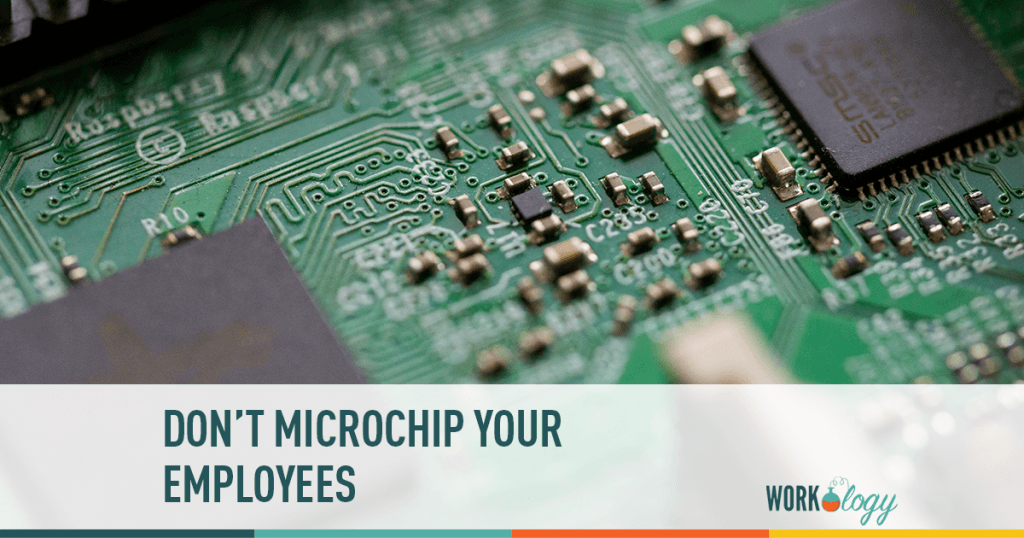So we’re microchipping our employees now, huh?
Over the last year more and more companies have offered microchip implants to employees as an optional fun experiment. In some organizations they’re meant to replace keycards. In others they’ll collect data about employees throughout the work day – how long they’re on task, how many breaks they take, and just generally how the work is affecting their bodies.
So far microchipping has been confined to smaller organizations, and often newer companies where there isn’t a solidified company culture and they haven’t yet hired their first HR employee. Usually, too, these organizations try to put a fun gloss on chipping. This company even threw a implantation party, where employees lined up to get their chips while also eating organic chips.
Mandating Trust
While implants may seem like the next logical step after wearables, there’s an important difference between downloading data from your employees smart watch and downloading data from your employees subcutaneous microchip implant: they can’t take the microchip off. They can’t remove it. They can’t turn it off. They are carrying a piece of work with them everywhere they go.
In microchipping your employees you’ve effectively staked a claim on their bodies, as though they are your pets. You, their employer, own the microchips which employees will carry around inside their bodies 24/7. You have a right to the data that chip gathers, per your agreement with them, and employees must trust that you will keep it secure and use it ethically.
But can they trust you? You’ve already reduced them to: a data spread; a mobile extension of your company’s presence in the world; an interchangeable piece of property to be tracked on FindMyEmployee.com. You have already proven that you trust that microchip more than their voice, that whatever data it gathers is more significant than their opinions and evaluations.
While microchipping pilot programs are being presented as entirely opt-in, the pressure employees feel to fit in and be a team player is often heavy, especially in a startup environment. Listen, are you sure your employees are as into this as you are?
Safety and Legal Considerations
In addition to the general creepiness of microchipping programs, I often wonder if these companies have thought through the potential liabilities that come with implanting company-owned devices into their employees’ bodies. What if the chip malfunctions? What if the database is hacked? What if the employee quits or just doesn’t want to be tracked anymore? What if everyone implanted with a chip gets an infection?
The potential consequences of your microchipping program collapsing due to mismanagement or accidents are, well, big. Lawsuits and fines big. Too, you should consider that this is an under-legislated and under-studied form of technology and you could find, a few years in, that state or federal legislators have outlawed your chip program. Are the risks here really worth the reward of whatever data you manage to collect?
Microchipping employees is still new to the U.S. but it’s been expanding rapidly in Europe. Look to see the trend rapidly expand here too. But I want you to consider whether it’s a trend you really want to be a part of, no matter the conveniences and data that might be gained through it. Have you thought through all the potential liabilities that go with with? And honestly, do you even have a good reason for implanting a microchip in your employees in the first place, or is it just a fun new trend?
Treating your employees like pets or property; inserting yourself into every part of their life, following them even on vacations and being there even when they sleep – none of these are a basis for a good relationship. All of them are the potential basis for a lawsuit, and far more Big Brother than you, as an ethical employer, should be comfortable with.
Don’t microchip your employees. It’s that simple.








3 Comments
My reaction. Right hand slapped against the forehead.
I heard and read a lot of discussion around this topic. This article does a great job of describing why employers should NOT be doing this. I’m also waiting for the person who also alleges that if they can be tracked 24/7, they should also be paid 24/7. The DOL will have a field day with that. Great blog post!
That is such a good point. Tracking your employees 24/7 opens up a whole other can of worms!
Comments are closed.